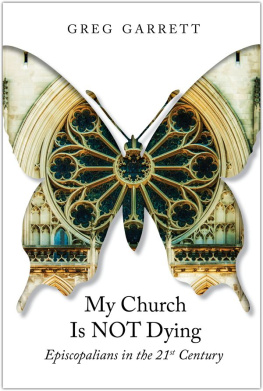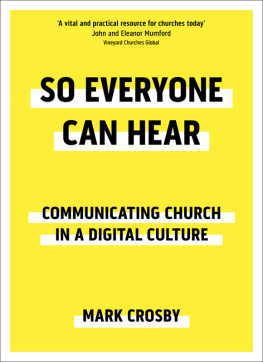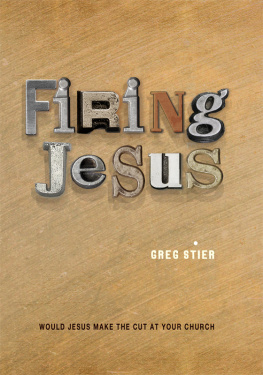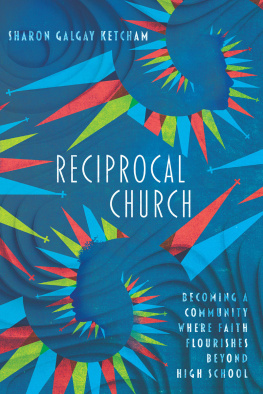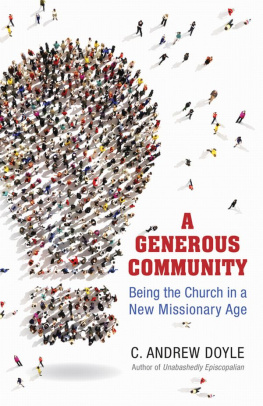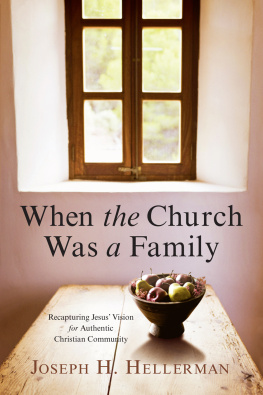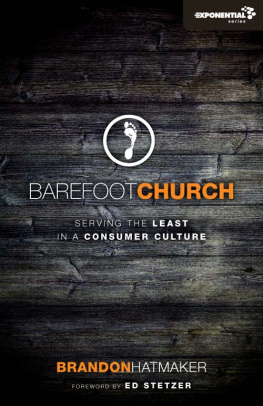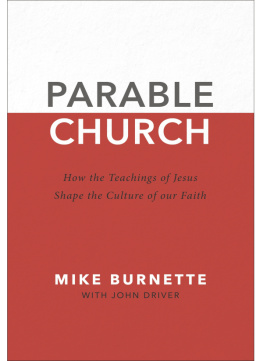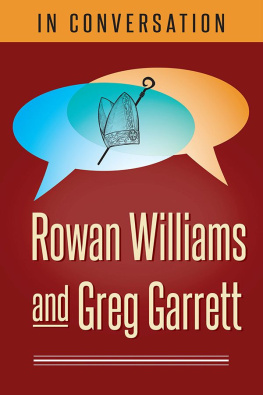
Copyright 2015 by Greg Garrett
All rights reserved. No part of this book may be reproduced, stored in a retrieval system, or transmitted in any form or by any means, electronic or mechanical, including photocopying, recording, or otherwise, without the written permission of the publisher.
Unless otherwise noted, the Scripture quotations contained herein are from the New Revised Standard Version Bible, copyright 1989 by the Division of Christian Education of the National Council of Churches of Christ in the U.S.A. Used by permission. All rights reserved.
Morehouse Publishing, 19 East 34th Street, New York, NY 10016
Morehouse Publishing is an imprint of Church Publishing Incorporated.
www.churchpublishing.org
Cover design by Laurie Klein Westhafer
Typeset by PerfecType, Nashville, TN
Library of Congress Cataloging-in-Publication Data
Garrett, Greg.
My church is not dying : Episcopalians in the 21st century / Greg Garrett.
pages cm
Includes bibliographical references.
ISBN 978-0-8192-2934-2 (pbk.) -- ISBN 978-0-8192-2935-9 (ebook) 1. Church renewal. 2. Episcopal Church. I. Title.
BX5933.G37 2015
283'.7309051--dc23
2014043046
For the Episcopal Church,
and all who love her
Dont let your heart grow cold.
I will call you by name.
I will share your road.

Mumford and Sons, Babel
Compline is an ancient monastic office. For many it is old school, destined to be gone soon. Yet, at St. Marks Cathedral in Seattle it has gone on just about every Sunday night for fifty-eight years. Currently there are no signs of its demise. In fact, a normal Sunday night will see five hundred to seven hundred people, most of them under thirty, who show up at 9:30 p.m. to be reverently present for the exactly thirty-minute chanted service. Taking part in this experience cannot help but move you. When the choristers leading the prayers come to the Creed, everyone in the place stands. Many do not know why, but they do it. When the Creed is over, they drop back into their positions, sitting, slouching, laying down, or sitting in their lawn chair just inches away from the bishops chair.
Yes, it is theatrics and a mere curiosity for some, but the many stories I have heard since becoming bishop of this Diocese of Olympia, from young and old alike, make me ask, So what? It comes with humor too, which more of our practice should. Recently, some alums of the Compline Choir told about a Sunday evening in the 1960s when one of the choristers came running into the choir room to announce that a naked woman had crawled into the bishops chair just before Compline was to begin. Another alum said, Yes, and you never saw that choir room empty so quickly!
Many of those attending Compline have been asked why they attend. There are as many responses as people, but an overwhelming consistency in the answers revolve around this general idea: Here is a space like no other in my world. In my life I need more, and this gets me closer to that. They dont have to understand it. They simply feel it.
That reality, that need, and the change in generations are bumping up against a much more scientific and factual reality that, I believe, we are leaving behind (or at the very least putting in proper place and perspective). I am living in hope that we are coming to the realization that our traditions are not useless and dead, but rather mysterious and alluring to a new generation. It is not that our tradition is bad. The problem is that we dont know it anymore. It is more a lapse in formation than the need to leave it behind. It is also a bit of a misread about those who come to us searching.
I see this revealed in many ways. Some time ago, one of the rectors in our diocese contacted me about a request that had been made by a few in the church to stop reciting the Nicene Creed on Sunday. It turns out they no longer were sure if they believed it all. My first response was, That is why we need to keep saying it every Sunday, because we are no longer sure we believe it all. But, after that, I also told him I would love to come and share with the congregation why I love it, why I do not want to lose it, and why I was saying no to their request.
I see it this way: The Creeds are the melody of Christianity. They are the song you cannot get out of your head. (I think this is why so many of the same people who would just as soon throw the Nicene Creed into the ditch of useless history sing hymns laced with some of the worst theology I can imagine with tears running down their faces.) Well taught and reflected upon, I think the Creeds can be that for us. They used to be chanted, not just said, singing of that which cannot be put fully into words.
Yes, I know, the Creeds are political documents, haggled over, and compromised. I get that totally. But I also believe in the power and cleverness of the Holy Spirit just enough to believe that grace can work through any process, and that it did in this one. These words are like the ancient tribal stories that elders and chiefs would tell. They would often end those with something like, Now I dont know if it all happened just like that, but if you think about it long enough, you will know that it is true. I see the Creeds just the same way. They are words that attempt to describe the indescribable. It is our tune, our melody. We need to sing it, together, if for no other reason than to honor our ancestors who, in all their human frailty, desperately wanted to pass that melody down to future generations.
It is the difference between facts and truth. We have become a people of facts, and if no facts can be brought to bear on it, then it must not be true. The people that handed these Creeds down, along with our faith, were less interested in that version of the truth. We can make a leapassuming we are smarter than they werebut I think we head down that road at our great peril. That is a road we have traveled of late, and it might be time for us to consider the next exit.
Many people are saying the Church is dying. I have never believed that. It is changing and always has been, but it is not dying. The Church belongs to God. It is the expression of God in this world. It will survive. The question is whether our form of honoring that tradition, our expression, our brand of it will survive. That, indeed, is up in the air, but that is also an entirely different question.
I have known Greg Garrett for over ten years, and in that time there is one thing I have never doubted about him: his belief that our church is not only alive, but is poised to change the world. He has never insinuated that the church is dying, nor does he carry himself like someone who thinks it is. He has lovingly challenged the church, to be sure, but more than anything he has helped me, and many I know and love, to see the church in a new light. In so doing he has revealed for us the church we know can be and is, if one only strives to see it.
In these past decades the Church has tried so many programs, strategies, and models. They can be effective, but the primary thing is knowing our motives, spending enough time digging ever deeper into our collective soul to see the sometimes rather self-centered nature of all of our effort to save the Church. It is not enough to know the how and the what; we have to also know the why.
In my day-to-day vocation as bishop I am constantly amazed at some of the things on which we spend our energy and passion. I am equally convinced that when the church stays focused on sharing the message of Jesus Christ and on being that message in the world, then our motives are much closer to what the Church should and will be.

